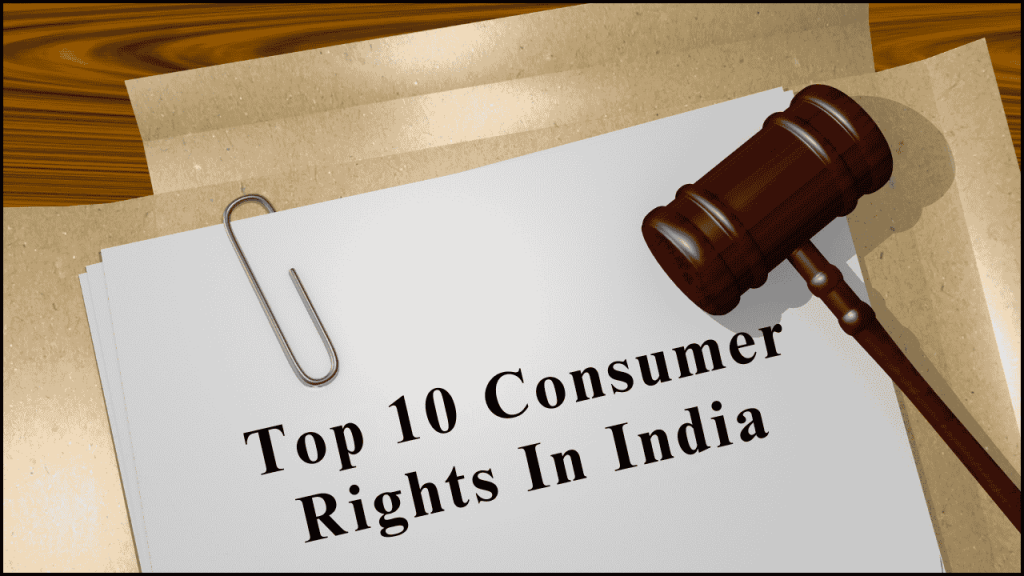
In a rapidly evolving market like India, where both online and offline shopping are booming, being an informed consumer is more important than ever. Whether you’re buying a product, hiring a service, or placing an order through a mobile app, your rights as a consumer are protected under the Consumer Protection Act, 2019. As we move through 2025, understanding these rights is essential for making smart, safe, and fair purchases.
Here’s a human-friendly, detailed guide to the Top 10 Consumer Rights every Indian should be aware of in 2025.
1. Right to Safety
The right to safety means consumers must be protected against products and services that are hazardous to life or property. Whether you’re buying an electronic item, using a gas cylinder, or purchasing packaged food, manufacturers and sellers must ensure their goods are safe for use.
In 2025, with increased usage of digital gadgets and household smart devices, this right is crucial. Always check safety certifications like ISI, BIS, or FSSAI before making a purchase.
2. Right to be Informed
As a consumer, you have the right to know what you’re paying for. This includes complete information about the product or service: price, quantity, ingredients, expiry date, manufacturer details, terms and conditions, and potential risks.
With growing online marketplaces and app-based services, it’s your right to receive full product descriptions, user reviews, and accurate ratings before making any decision.
3. Right to Choose
This right ensures that consumers have access to a variety of goods and services at competitive prices without any monopolistic or unfair trade practices. It empowers you to make informed choices from a range of brands and providers.
In 2025, thanks to increased digitization and e-commerce competition, this right allows consumers to enjoy better deals, more options, and convenience.
4. Right to be Heard
Your complaints and feedback matter. If a product or service falls short of expectations, you have the right to voice your concerns and expect redressal.
From customer care helplines to official consumer portals and grievance cells, consumers today can raise their voice easily. Brands are also more proactive in addressing concerns due to public reviews and social media platforms.
5. Right to Seek Redressal
If you’ve been cheated, misled, or sold a faulty product or service, you have the right to seek compensation or a refund. The Consumer Protection Act provides mechanisms to approach Consumer Disputes Redressal Commissions at the district, state, and national levels.
In 2025, the government’s E-Daakhil Portal allows you to file complaints online without needing a lawyer, making justice faster and more accessible.
6. Right to Consumer Education
Consumers have the right to be educated about their rights, duties, and the process of redressal. Lack of awareness is a major reason many people don’t file complaints, even when wronged.
Numerous government campaigns, online platforms, and school curricula now emphasize consumer education. Websites like consumerhelpline.gov.in provide helpful guides, videos, and complaint registration options.
7. Right Against Unfair Trade Practices
This right protects consumers from being exploited through misleading advertisements, deceptive pricing, fake reviews, or false promises. If you’re sold a substandard product or tricked by an ad, you can take legal action.
With the rise of influencer marketing and AI-generated ads in 2025, authorities are keeping a closer watch on misleading promotions. New digital norms ensure stricter action against deceptive online sales.
8. Right to Protection of Personal Data and Privacy
As e-commerce and online banking become mainstream, your personal data—like phone number, Aadhaar, or card details—must be protected. Under India’s Digital Personal Data Protection Act, 2023, companies are now required to store and use consumer data responsibly.
If your data is shared without consent or misused, you can file a complaint with both consumer courts and the Data Protection Board of India.
9. Right to a Fair Contract
Many service providers, especially in telecom, insurance, and banking, use one-sided agreements that favor the company. In 2025, you have the right to demand clarity, fairness, and transparency in every contract or subscription.
Any terms that are vague, confusing, or give unfair power to the seller can be challenged in court.
10. Right to File Class Action or Group Complaints
Sometimes, a faulty product or poor service affects many people. The Consumer Protection Act, 2019 allows consumers to file class-action complaints as a group. This is especially useful in cases like defective electronics, misleading educational services, or unfair telecom billing.
With digital platforms, coordinating group complaints is easier now, making this right a strong weapon in the hands of consumers.
Bonus: Rights in Online Shopping and E-Commerce (2025 Update)
The government has introduced e-commerce rules under the Consumer Protection (E-Commerce) Rules, 2020, which have been further strengthened by 2025. These include:
- Right to transparent return and refund policies
- Right to cancel orders without paying hidden charges
- Right to contact details of the seller
- Right to get a bill/invoice even from online sellers
Major platforms like Amazon, Flipkart, and Meesho must comply with these regulations or face penalties.
Final Thoughts
In today’s marketplace, consumers are no longer passive buyers—they are powerful participants in the economy. Whether you’re buying a pen, booking a flight, or installing a solar panel, your rights ensure you’re not cheated or misled.
Knowing these top 10 consumer rights empowers you to make smarter choices, demand fair treatment, and seek justice when things go wrong. Stay alert, stay informed, and don’t hesitate to raise your voice. In a country like India, with over a billion consumers, awareness is the first step toward accountability.